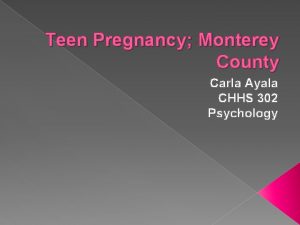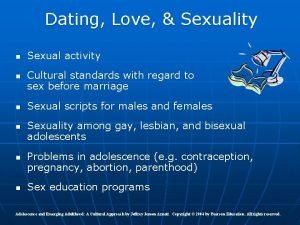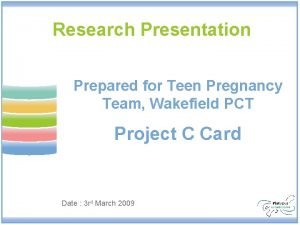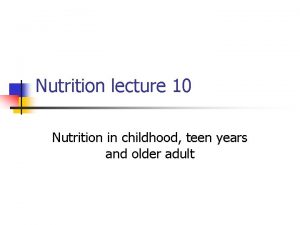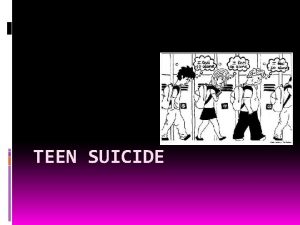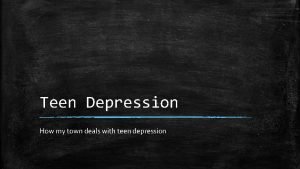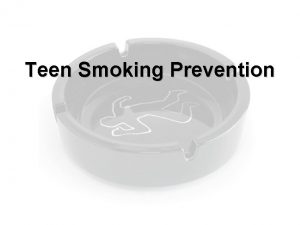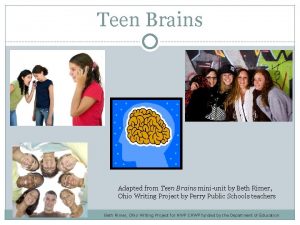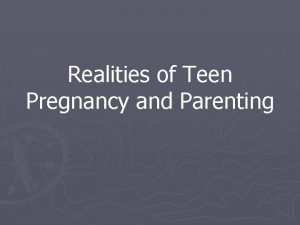Teen Depression WHAT IS DEPRESSION Teen depression is
















- Slides: 16

Teen Depression

WHAT IS DEPRESSION? ▪ Teen depression is a serious mental health problem that causes a persistent feeling of sadness and loss of interest in activities. It affects how your teenager thinks, feels and behaves, and it can cause emotional, functional and physical problems. Although depression can occur at any time in life, symptoms may be different between teens and adults. ▪ Issues such as peer pressure, academic expectations and changing bodies can bring a lot of ups and downs for teens. But for some teens, the lows are more than just temporary feelings — they're a symptom of depression. ▪ Teen depression isn't a weakness or something that can be overcome with willpower — it can have serious consequences and requires long-term treatment. For most teens, depression symptoms ease with treatment such as medication and psychological counseling. www. mayoclinic. org/diseases-conditions/teen-depression

SYMPTOMS ▪ A change from the teenager's previous attitude and behavior that can cause significant distress and problems at school or home, in social activities or other areas of life. ▪ Symptoms can vary in severity, but changes in your emotions and behavior may include the following examples: www. mayoclinic. org/diseases-conditions/teen-depression

Emotional Changes: ▪ Feelings of sadness, which can include crying spells for no apparent reason ▪ Feeling hopeless or empty ▪ Irritable or annoyed mood ▪ Frustration or feelings of anger, even over small matters ▪ Loss of interest or pleasure in normal activities ▪ Loss of interest in, or conflict with, family and friends ▪ Low self-esteem www. mayoclinic. org/diseases-conditions/teen-depression ▪ Feelings of worthlessness or guilt ▪ Fixation on past failures or exaggerated self-blame or self-criticism ▪ Extreme sensitivity to rejection or failure, and the need for excessive reassurance ▪ Trouble thinking, concentrating, making decisions and remembering things ▪ Ongoing sense that life and the future are grim and bleak ▪ Frequent thoughts of death, dying or suicide

Behavioral Changes: ▪ Tiredness and loss of energy ▪ Insomnia or sleeping too much ▪ Changes in appetite ▪ Use of alcohol or drugs ▪ Agitation or restlessness ▪ Slowed thinking, speaking or body movements ▪ Social isolation ▪ Frequent complaints of unexplained body aches and headaches www. mayoclinic. org/diseases-conditions/teen-depression ▪ Poor school performance or frequent absences from school ▪ Neglected appearance ▪ Angry outbursts, disruptive or risky behavior, or other acting-out behaviors ▪ Self-harm — for example, cutting, burning, or excessive piercing or tattooing ▪ Making a suicide plan or a suicide attempt

WHEN TO SEE A DOCTOR ▪ When symptoms continue or begin to interfere in your life, talk to a doctor or a mental health professional trained to work with adolescents. Your family doctor or pediatrician is a good place to start. Or your school counselor or trusted teacher. ▪ Symptoms likely won't get better on their own — and they may get worse or lead to other problems if untreated. Depressed teenagers may be at risk of suicide, even if signs and symptoms don't appear to be severe. ▪ If you think you may be depressed — or you have a friend who may be depressed — don't wait to get help. Talk to a health care provider such as your doctor or school nurse. Share your concerns with a parent, a close friend, a spiritual leader, a teacher or someone else you trust. www. mayoclinic. org/diseases-conditions/teen-depression

CAUSES – Unknown… Biological chemistry. ▪ Neurotransmitters are naturally occurring brain chemicals that carry signals to other parts of your brain and body. When these chemicals are abnormal or impaired, the function of nerve receptors and nerve systems change, leading to depression. Hormones. ▪ Changes in the body's balance of hormones may be involved in causing or triggering depression. Inherited traits. ▪ Depression is more common in people whose blood relatives also have the condition. Early childhood trauma. ▪ Traumatic events during childhood, such as physical or emotional abuse, or loss of a parent, may cause changes in the brain that make a person more susceptible to depression. Learned patterns of negative thinking. ▪ Teen depression may be linked to learning to feel helpless — rather than learning to feel capable of finding solutions for life's challenges. www. mayoclinic. org/diseases-conditions/teen-depression

RISK FACTORS ▪ Negative self-esteem, such as obesity, peer problems, long-term bullying or academic problems ▪ Having been the victim or witness of violence, such as physical or sexual abuse ▪ Having other conditions, such as bipolar disorder, an anxiety disorder, a personality disorder, anorexia or bulimia ▪ Having a learning disability or attention-deficit/hyperactivity disorder (ADHD) ▪ Having ongoing pain or a chronic physical illness such as cancer, diabetes or asthma ▪ Having a physical disability ▪ Having certain personality traits, such as low self-esteem or being overly dependent, self-critical or pessimistic www. mayoclinic. org/diseases-conditions/teen-depression

RISK FACTORS CONTINUED… ▪ Abusing alcohol, nicotine or other drugs ▪ Being gay, lesbian, bisexual or transgender in an unsupportive environment ▪ Family history and issues with family or others may also increase your risk of depression, such as: ▪ Having a parent, grandparent or other blood relative with depression, bipolar disorder or alcoholism ▪ Having a family member who committed suicide ▪ Having a dysfunctional family and conflict ▪ Having experienced recent stressful life events, such as parental divorce, parental military service or the death of a loved one www. mayoclinic. org/diseases-conditions/teen-depression

DIAGNOSIS Physical exam. ▪ The doctor may do a physical exam and ask in-depth questions about your health to determine what may be causing depression. In some cases, depression may be linked to an underlying physical health problem. Lab tests. ▪ For example, your doctor may do a blood test called a complete blood count or test your thyroid to make sure it's functioning properly. Psychological evaluation. ▪ This evaluation includes a discussion about thoughts, feelings and behavior, and may include a questionnaire. These will help pinpoint a diagnosis and check for related complications ▪ Your mental health provider may use the symptom criteria in the Diagnostic and Statistical Manual of Mental Disorders (DSM-5), published by the American Psychiatric Association, to diagnose major depression www. mayoclinic. org/diseases-conditions/teen-depression

TREATMENT Treatment selection depends on the type and severity of your teenager's symptoms. A combination of talk therapy (psychotherapy) and medication can be very effective for most teens with depression. ▪ Antidepressant Medication ▪ Psychotherapy: is a general term for treating depression by talking about depression and related issues with a mental health provider. • Learn about the causes • Learn how to identify and make changes in unhealthy behaviors or thoughts • Explore relationships • Find better ways to cope and solve problems www. mayoclinic. org/diseases-conditions/teen-depression • Set realistic goals • Regain a sense of happiness and control • Help ease symptoms such as hopelessness and anger • Adjust to a crisis or other current difficulty

LIFE STYLE/HOME REMEDIES ▪ Stick to the treatment plan. ▪ Learn about depression. ▪ Encourage communication with loved ones. ▪ Pay attention to warning signs. ▪ Make sure to adopts healthy habits. ▪ Avoid alcohol and other drugs. www. mayoclinic. org/diseases-conditions/teen-depression

ALTERNATIVE MEDICINE ▪ Acupuncture ▪ Relaxation techniques, such as deep breathing ▪ Yoga or tai chi ▪ Meditation ▪ Guided imagery ▪ Massage therapy ▪ Music or art therapy ▪ Spirituality ▪ Relying solely on these methods is generally not enough to treat depression. But they may be helpful when used in addition to medication and psychotherapy. www. mayoclinic. org/diseases-conditions/teen-depression

COPING AND SUPPORT ▪ Make and keep healthy friendships. ▪ Stay active. ▪ Ask for help. ▪ Have realistic expectations. ▪ Simplify life. ▪ Structure time. ▪ Keep a private journal. ▪ Connect with other teens who struggle with depression. ▪ Stay healthy. www. mayoclinic. org/diseases-conditions/teen-depression

WHEN TO GET HELP: Suicide is often associated with depression. If you think you may hurt yourself or attempt suicide, call 911 or your local emergency number immediately. Also consider these options if you're having suicidal thoughts: • Call your mental health specialist • Call a suicide hotline number — in the U. S. , call the National Suicide Prevention Lifeline at 1 -800 -273 -TALK (1 -800 -273 -8255) • Seek help from your primary care doctor or other health care provider • Reach out to a close friend or loved one • Contact a minister, spiritual leader or someone else in your faith community www. mayoclinic. org/diseases-conditions/teen-depression

There's no sure way to prevent depression. However, these strategies may help. ▪ Take steps to control stress, increase resilience and boost self-esteem to help handle issues when they arise ▪ Reach out for friendship and social support, especially in times of crisis PREVENTION ▪ Get treatment at the earliest sign of a problem to help prevent depression from worsening ▪ Maintain ongoing treatment, if recommended, even after symptoms let up, to help prevent a relapse of depression symptoms www. mayoclinic. org/diseases-conditions/teen-depression



